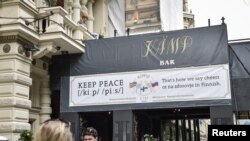As Finnish citizens await the arrival of U.S. President Donald Trump and Russian President Vladimir Putin for their historic summit in Helsinki on Monday, they have reason to contemplate their own nation's complex relationship with their powerful eastern neighbor.
Sandwiched between Sweden and Russia, Finland is often referred to as a nation "between East and West," both for its geographic situation and the balancing act it performed during the Cold War, when it maintained a careful neutrality.
That stance was designed to "resolve the latent conflict between ideological ties and strategic realities," wrote Max Jakobson, one-time Finnish ambassador to the United Nations, in his book Finland: Myth and Reality.
Finland, he says, is "a Western country ideologically and culturally, as well as part of the Western economic system." But that leaning is overlaid with layers of complexity due to its location and history with Russia.
For roughly a century before it declared independence in 1917, Finland was an autonomous Grand Duchy in the Russian empire, subject to the differing approaches of various Russian monarchs. Emperor Alexander II (1818-81) ruled as a moderate who encouraged liberal institutions in Finland; today, he is remembered with a well-regarded statue in Helsinki's Senate Square.
Later leaders, in contrast, tried to Russify Finland and insisted that its internal administration must not "conflict with the interests and honor of Russia."
EU member, not NATO
A Finnish-Soviet Friendship Treaty dissolved with the collapse of the Soviet Union and Helsinki became a member of the European Union in 1995, an act that puts Finland squarely in the Western camp. But the majority of Finns still are uninterested in joining the North Atlantic Treaty Organization (NATO), at least in part for fear of antagonizing their neighbor to the east.
In an apparent nod to cordial relations, Russia's Putin visited Helsinki for Finland's centennial celebration last year; the event was marked by pictures of him and Finnish President Sauli Niinisto sightseeing aboard a steamboat en route to dinner and a ballet performance.
On the other hand, Finland has in store enough anti-tank mines to deploy to its 1,300-kilometer border with Russia that it could average more than one mine per meter, should peace ever turn into war. In the words of Pekka Toveri, brigadier general and defense attache at the Finnish Embassy in Washington, if you come to Finland you had better be invited.
"Finland doesn't have a defense force," Toveri told an audience at The Institute of World Politics earlier this year. "Finland is a defense force."
"We are the most capable defense force in Northern Europe," supported by a conscription policy and a readily deployable 280,000-strong wartime army, he added. "We have a capable neighbor, sometimes not so aggressive, sometimes a little bit more aggressive, but it's always there, and you have to be prepared for that."
Winter War and beyond
The world witnessed Finland's vigilance and will to independence in the Winter War that started with a Soviet invasion in November 1939. Directed by Finland's legendary Marshall Carl Gustaf Mannerheim, world skiing champion Pekka Niemi and others of his countrymen led squads on skis that penetrated the Soviet front lines and inflicted severe casualties. In the end, Finland lost more territory than the Stalin-led Soviet government had initially demanded, but it taught its "capable neighbor" the cost of fighting the Finns.
In recent surveys, Toveri said, 78 percent of Finns still say the country should resist any attack, "even if the end result is uncertain."
Analysts say Finland's history with Russia may offer lessons for the United States heading into the Trump-Putin summit.
"Finland has always been very clear-eyed about Russia," said Erik Brattberg, a native of Sweden who heads the Europe Program at the Carnegie Endowment for International Peace, a Washington-based global think tank. "At the same time, Finland has kept a 'businesslike' relationship toward Russia."
Brattberg warned that continuing to view Finland as a neutral country could lead to a "false narrative." Even though Helsinki has been chosen to host the summit, Finland "is firmly part of the West and a deep partner of U.S. and NATO" and a strong proponent of a rules-based order among states.
"That's why Finland is supportive of maintaining sanctions against Russia over the issue of Crimea. They would not like to have Crimea be recognized as part of Russia, as that would undermine the type of rules-based order — things like national sovereignty, territorial integrity — that a small country with a long border facing Russia, like Finland, ultimately depends on," he said.
Great powers, smaller states
Kirsti Kauppi, Finland's ambassador to the United States since 2015, said in an interview it is not "sustainable" for the large countries to think they can set the rules of international relations.
"We think that we need broad-based cooperation, that small and medium-sized countries also have a lot to contribute and a lot at stake," Kauppi said.
Kauppi called for closer cooperation not only between the United States and Finland, but also between Washington and the European Union and the Nordic region generally: "The world is broader than the transatlantic community, certainly, but the basic link between the U.S. and the EU is extremely important in terms of how the international community takes shape."
Urho Kekkonen, Finland's president from 1956 to 1982, once acknowledged that small states have little power to influence the course of international events. But, he said, "Great Powers possessing the means of destroying the world bear the responsibility for the maintenance of peace," while "smaller states can and must constantly remind them of this responsibility."











